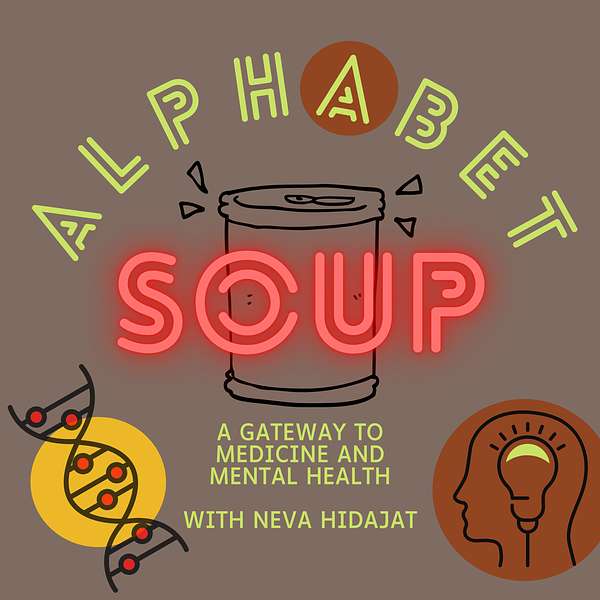
Alphabet Soup: A Mental Health & Medicine Podcast
Alphabet Soup: A Mental Health & Medicine Podcast
Ep. 22 Why Did We All Binge-Watch Squid Game?
Children's games, debt-ridden players, and a death penalty... These are a few of the components that make up Squid Game's satirical plot. But what exactly made the show so addicting to watch? The answer lies in the psychology of addictive behavior. Listen to find out more!
If you’ve seen Squid-Game you are probably amongst the majority who started the first episode and ended up binge-watching the entire show. In Squid-game’s debut week on Netflix, it broke the platform’s record for biggest series launch, garnering over 111 million viewers and ranking No. 1 of the most streamed show in 90 countries. The latest update records the number of viewers to consist of 142 million subscriber households, and now the show tracks at No. 1 in 97 countries. Still Squid Game fans are growing exponentially. So why is Squid Game so popular? And more importantly, why did we all binge-watch it?
Before we continue, a quick disclaimer that this episode will contain some plot spoilers. You have been warned!
Squid Game is set in a dystopian world and its plot highlights the harsh reality of class distinctions. 456 deeply indebted people find themselves as contestants in the “Squid Game” where they engage in a dramatically up-scaled version of “Red Light, Green Light” in hopes of winning prize money. They soon discover that the penalty for moving after the “Red-Light” was to be shot to death by a highly accurate sniper. In chaos after they realize the high-stakes of the game, many contestants attempt to escape the prison-like arena only to be shot with deadly-accuracy the moment their motion is detected. After the massacre of “Red-Light, Green-Light”, the surviving players vote to abandon the games and go home, but before they leave, they are informed that they are welcome to return. The next episode, titled “Hell”, ironically doesn’t focus on life inside the games, but rather follows the players as they face the devasting realization that nothing has changed about their lives outside of the games: In fact, their realities prove just as unforgiving as the bleak future that awaits them inside the game. In Squid Game, the penalty for losing might be brutal, but for the most desperate, it gave them a chance. Perhaps not so surprisingly, the reality-stuck players return despite the cruel consequences of failing and place all their luck on surviving the five remaining, deadly, children’s games.
Part of the reason for Squid Game’s success is, as NY times critic Mike Hale put it, the “meme-readiness” of the show, which helped it to go viral and therefore generated a lot of interest in watching the show. Vans, the company responsible for creating the white, slip-on shoes that every Squid Game contestant is seen sporting, even noted a sudden spike in sales on that particular product after the show became an internet sensation. Additionally, with Halloween around the corner, and Squid Game costumes in high-demand, South Korea’s previously struggling garment industry has been revived, according to an Asia Pacific news article. Basically, if you haven’t seen Squid Game, what are you waiting for? And if you haven’t, let me predict that you’ll probably binge-watch the show.
The suspenseful, dopamine-inducing plot twists of Squid Game, make it hard to resist turning off the tv. The reason why Squid Game is so gripping, is all in the psychology of addictive behavior. Dr. Renee Carr, a clinical psychologist, explains, “Dopamine gives the body a natural, internal reward of pleasure that reinforces continued engagement in that activity.” So, while Squid Game’s episode layout is skillfully planned to take advantage of cliffhangers, it isn’t necessarily the show, but the rush of dopamine that we get from dying to know what comes next, that makes it hard for us to stop.
Binge-watching, like other forms of addictive behavior, can be detrimental to our health and wellbeing. What’s more, recent studies have shown that people can build up a tolerance to dopamine-induced activities; eventually, this makes them require longer periods of activity to receive the same amount of pleasure. Binge-watching is also linked to lower sleep quality, depression, and abject memory retention: in other words, episodes we binge-watch might actually be less memorable than watching new episodes on a weekly basis. Not only this, but many binge-watchers experience a brief stint of depression after finishing a show. This is because our brain stimulation enters a state of slow activity and watchers actually mourn the loss of hyperstimulation.
As you can see, binge-watching can develop into a dangerous activity. But it can also be a way for many people to unwind from their busy schedules. So, here are some ways to fully reap the benefits of binge-watching. First, try to set some parameters before hitting play. For example, commit to no more than 3 episodes. Saying it verbally helps too, “I’m watching 3 episodes max.” Secondly, it’s important to scope out other fun activities like hanging out with friends or going to the movies. Creating other outlets of pleasure can help people maintain balance and prevent behavioral addiction, like binge-watching, from taking control of their lives.
For today’s bit I’d like to share the inspirational story of Squid Game’s director, Hwang Dong Hyuk. His idea for Squid Game was rejected by studios for 10 years. At one point, he had to sell his laptop for $675 dollars to afford a living. But now, the show has become Netflix’s most-watched show of all time.
Alright guys, thanks for listening to today’s episode, and if you want more episodes like this make sure to let me know by sending me a dm @alphabetsoup.podcast on Instagram! Have a great week and if you’ve somehow escaped all the Squid-Game mania, well I think it’s time to get it on! Responsibly of course.